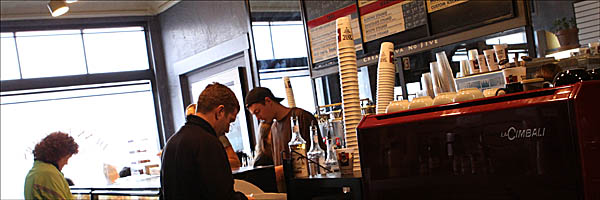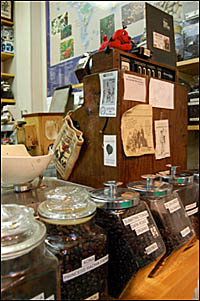
In January, Starbucks announced that 300 more stores would be closing, making a grand total of 900 Starbucks closing in less than a year. Of the 600 stores closed last year five percent were closed in Minnesota. With more closings in the coming year Minnesota will remain the only state in the country where the majority of coffee houses are not Starbucks.
As Starbucks continues dominate the west coast with fifty-six stores in the city of Seattle alone, they have yet to find a strategy in Minnesota. Giving birth to coffee giants like Dunn Brothers Coffee and Caribou Coffee, Minnesota has been a thriving coffee community since the seventies when Jim Cone opened Coffee & Tea Ltd.
Traveling to the west coast in the early seventies, Cone studied coffee and brought back high quality coffee to the Midwest. Cone cultivated a community of aficionados, opening his first store in Deephaven in 1976; purchasing a 1910 Royal Roaster and sourcing his own coffee. The roaster’s flames visibly flicker beneath the roasting drum that spins loudly in the front of the shop. Cone says that “the direct heat is what gives the highest quality roast, I wouldn’t use anything else.” For as long as Cone has had the roaster he said it has never broken down. Roasting five to six days a week, Cone doesn’t have the time to fix a broken roaster. He is busy roasting coffee for another store he operates in the Mall of America and the coffee used for the Surly Brewing Company Coffee Bender; a rich and bold Sumatran coffee.

In 1979 Cone moved his roaster from Deephaven to the window of a small shop on 43rd West in Linden Hills. The walls are filled with glass jars of coffee and most of the floor is taken up by jute burlap bags of green coffee. Cone offers a menu of close to 150 coffees. His selection includes rare coffees from Nepal, Haiti, St. Helena and the Galapagos Islands. Cone says that he is one of the only importers in the country bringing in coffee from the Galapagos. For the connoisseur, Cone offers Kopi Luwak generally known as the most expensive coffee in the world. Coffee berries that have passed through the digestive tract of an Asian Palm Civet in Indonesia are the X-factor that gives this brew its uniquely complicated flavor; here in Minnesota, Cone makes this coffee regularly available to his customers for $10 a cup or $420 a pound.
In 1987 Ed and Dan Dunn joined Jim in the Midwest, moving from Eugene, Oregon to open the first Dunn Brothers on Grand Ave in St. Paul. Founded upon the slogan “Roasted Fresh Daily,” Ed and Dan believed for coffee to be fresh it needed to be roasted in the store. Prior to coming to Minnesota Ed learned how to roast from Kobos Coffee in Portland, Oregon in the early eighties. As the Grand Ave store boomed Ed and Dan decided to open another store using the concept of having a roaster in every store, a concept that was heretofore unknown. Nervous about expansion, Ed began developing computer controlled roasting software to ensure that each store would have consistent roasts. As the expansion progressed, the software was put on hold — Ed worked to train roasters himself. In 1994 Dunn Brothers evolved into a Twin Cities franchise bringing fresh roasted coffee to all corners of the metro area. Ed and Dan have since left the company. Today Dunn Brothers has 67 stores in Minnesota and 92 stores total. The store on Grand Ave still breathes quietly with live music, old-school regular customers and steamy windows. John Losstedt has been the roaster at the Grand Ave store for the last 15 years. He fires up the vintage Probat roaster every day and says: “I still joke with the founders that I’ve roasted more coffee than they have.”
Dunn Brothers met their biggest competition in 1992 when Kim and John Puckett returned from a trip to Alaska. With the opening of a store in Edina, the couple founded Caribou Coffee. Second only to Starbucks in terms of number of locations, the company has since climbed to the top of the coffee industry with almost 500 locations in 16 states and the District of Colombia. Caribou has branded the country with the slogan “life’s too short, stay awake for it,” and stepped up in ways that Starbucks cannot. In January, Starbucks announced that they would no longer be serving decaf in the afternoon to save on costs. Caribou quickly rose to the occasion providing free decaf on the first day that Starbucks would discontinue it. Alfredo Martel, the chain’s senior vice president, said: “Caribou Coffee is first and foremost a coffeehouse, emphasis on coffee. We strive to give our customers the very best coffee, when, where and how they want it.”
In May of 2008 Caribou was the host sponsor of the Specialty Coffee Association of America in Minneapolis. Coffee professionals from all over the country flew in to take place in the largest coffee convention of the year. Caribou Coffee led the way winning the Roasters Guild 2008 Roasters Choice Tasting Competition.
As Caribou Coffee competes with Starbucks nationally, Dunn Brothers and locally owned shops like Coffee and Tea Ltd. compete with Caribou in Minnesota. Each has brought to the Midwest something unique, whether it is a roaster in every store, a free cup of decaf or a rare coffee digested by an animal. For the Minnesota coffee drinker, the Starbucks closing on the corner is simple reminder that there is something better down the street.

Before all the Starbuck’s detractors gloat too much at Starbuck’s financial troubles, they’d better wait and see how many local coffee shops fold up during these tough economic times.
A number of Starbuck’s locations have closed in the Baltimore – D.C. metropolitan area.
I drove past the former location of The Daily Grind just north of Baltimore last week and that was a real shock. They have been in business at the center of a small somewhat isolated business community just inside the beltway for years and were one of the earlier coffee specialty shops in Baltimore. They have or had a few other locations for years in several other locations in the City. The web site shows 60 locations currently existent nationwide or about to be opened (??), with most in this area of the country.
Specialty coffee is a luxury item and overwhelming majority of coffee drinkers will cut back to something less costly when paring down their budget.
FWIW, there was a Caribou located NW of Baltimore near my son’s high school. I thought it was very good, but not that great. However, by then I was accustomed to buying the freshly roasted coffee beans of my choice (from about a dozen or more offerings of a local Baltimore roaster) each Saturday or Sunday at one of two farmers’ markets in the City. The one on Saturday ran year round and was a 4 block walk from my house.
A lot of chains of all sorts are closing some of their locations and more will follow.
Starbucks continues dominate the west coast to repeat what Sam just said but I think local “single origin” shops will continue to do a huge business because if a local Starbucks closes those same folks will drift down the street to what has been around for ages. I mean the local shops from the 60’s and 70’s, the real coffee cafe’s that are still all over the West Coast and I am sure
in all other parts of the country.
Perhaps the place does not have glass or stainless counters, lunch and afternoon snacks for the kiddies but it will have much better coffee.
ginny
I am an admitted coffee and espresso geek. I roast my own beans and know my Yirgacheffe from my Sidamo. I am happy not to frequent Starbucks in lieu of local roaster shops. Local shops like Cahoots actually have atmosphere. Others like Kopplin’s have stellar product and you know the money is staying local.
Thing is, as luxuries go, coffee is one of the cheapest. I can enjoy a fine espresso, made from freshly roasted, high quality beans for under $2 a pop. And I get as much enjoyment from that as I would a glass of wine. Other coffee enthusiasts understand.
Personally, I’d rather have more local shops and let Starbucks take its trendy unrelated accoutrement elsewhere.
Michael, you have seen the light and tasted the nectar. I am a coffee roaster for a local cafe. Shoot me an e-mail sometime, we can talk coffee. I started my roasting on a modified popcorn popper. eric@heavytable.com
Hi Erick and Michael, why Starbucks, MInnesota have a wonderful coffees, like caribou, dunn brothers, etc. But did you try my coffee Cafe Palmira. For the past four generations my family and I, we has been growing and haarvesting coffee in Guatemala, Huehuetenango, we are in the farmers market, mill city, kingfield, shoreview, sant paul winter market, I want you to try my coffee, thanks. http://www.cafepalmira.com